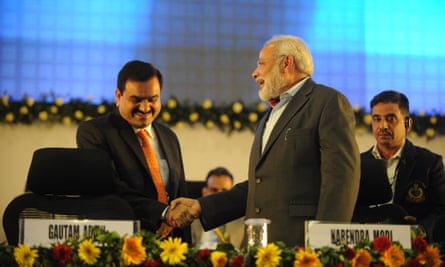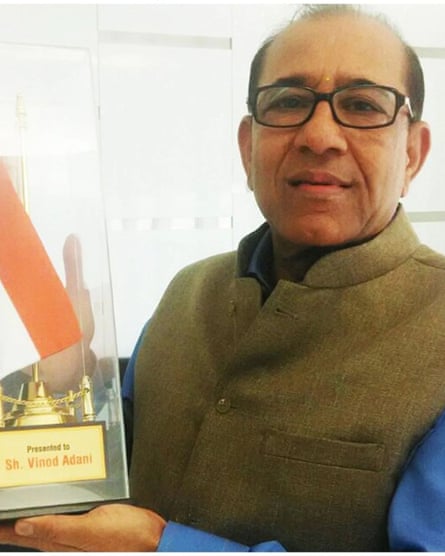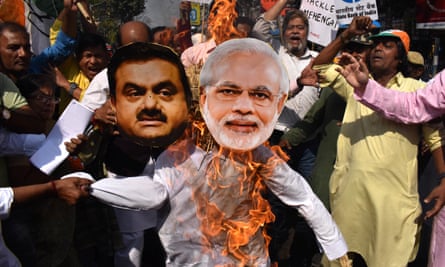[ad_1]
A billionaire Indian household with shut ties to the nation’s prime minister, Narendra Modi, secretly invested a whole lot of thousands and thousands of {dollars} into the Indian inventory market, shopping for its personal shares, newly disclosed paperwork counsel.
According to offshore monetary data seen by the Guardian, associates of the Adani household could have spent years discreetly buying inventory within the Adani Group’s personal firms throughout its meteoric rise to develop into one in all India’s largest and strongest companies.
By 2022, its founder, Gautam Adani, had become India’s richest person and the world’s third richest person, price greater than $120bn (£94bn).
In January, a report printed by the New York monetary analysis agency Hindenburg accused the Adani Group of pulling off the “largest con in corporate history”.
It alleged there had been “brazen stock manipulation and accounting fraud”, and the usage of opaque offshore firms to purchase its personal shares, contributing to the “sky high” market valuation of the conglomerate, which hit a peak of $288bn in 2022.
The Adani Group denied the Hindenburg claims, which initially wiped $100bn off the conglomerate’s market worth and value Gautam Adani his prime spot on the world wealthy listing.
At the time, the group called the research a “calculated attack on India” and on “the independence, integrity and quality of Indian institutions”.
Yet new paperwork obtained by the Organised Crime and Corruption Reporting Project (OCCRP), and shared with the Guardian and the Financial Times, reveal for the primary time the small print of an undisclosed and sophisticated offshore operation in Mauritius – seemingly managed by Adani associates – that was allegedly used to help the share costs of its group of firms from 2013 to 2018.
Up till now, this offshore community had remained impenetrable.
The data additionally seem to offer compelling proof of the influential role allegedly performed by Adani’s older brother, Vinod, within the secretive offshore operations. The Adani Group says Vinod Adani has “no role in the day to day affairs” of the corporate.
In the paperwork, two of Vinod Adani’s shut associates are named as sole beneficiaries of offshore firms by means of which the cash appeared to stream. In addition, monetary data and interviews counsel investments into Adani inventory from two Mauritius-based funds have been overseen by a Dubai-based firm, run by a recognized worker of Vinod Adani.
The disclosure might have vital political implications for Modi, whose relationship with Gautam Adani goes again 20 years.

Since the Hindenburg report was printed, Modi has faced difficult questions about the nature of his partnership with Gautam Adani and allegations of preferential remedy of the Adani Group by his authorities.
According to a letter uncovered by the OCCRP and seen by the Guardian, the Securities and Exchange Board of India (SEBI) had been handed proof in early 2014 of alleged suspicious inventory market exercise by the Adani Group – however after Modi was elected months later, the federal government regulator’s curiosity appeared to lapse.
In response to contemporary questions regarding the brand new paperwork, the Adani Group mentioned: “Contrary to your claim of new evidence/proofs, these are nothing, but a rehash of unsubstantiated allegations levelled in the Hindenburg report. Our response to the Hindenburg report is available on our website. Suffice it to state that there is neither any truth to nor any basis for making any of the said allegations against the Adani Group and its promoters and we expressly reject all of them.”
The offshore cash path
The trove of paperwork lays out a fancy net of firms that date again to 2010, when two Adani household associates, Chang Chung-Ling and Nasser Ali Shaban Ahli, started establishing offshore shell firms in Mauritius, the British Virgin Islands and the United Arab Emirates.
These monetary data seem to indicate that 4 of the offshore firms established by Chang and Ahli – who’ve each been administrators of Adani-linked firms – despatched a whole lot of thousands and thousands of {dollars} into a big funding fund in Bermuda referred to as Global Opportunities Fund (GOF), with these monies invested within the Indian inventory market from 2013 onwards.
This funding was made by introducing one more layer of opacity. Financial data paint an image of cash from the pair’s offshore firms flowing from GOF into two funds to which GOF subscribed: Emerging India Focus Funds (EIFF) and EM Resurgent Fund (EMRF).
These funds then seem to have spent years buying shares in 4 Adani-listed firms: Adani Enterprises, Adani Ports and Special Economic Zone, Adani Power and, later, Adani Transmission. The data shine a lightweight on how cash in opaque offshore constructions can stream secretly into the shares of publicly listed firms in India.

The funding choices of those two funds gave the impression to be made beneath the steering of an funding advisory firm managed by a recognized worker and affiliate of Vinod Adani, primarily based in Dubai.
In May 2014, EIFF seems to have held greater than $190m of shares in three Adani entities, whereas EMRF seems to have invested round two-thirds of its portfolio in about $70m of Adani inventory. Both funds seem to have used cash that got here solely from the businesses managed by Chang and Ahli.
In September 2014, a separate set of economic data set out how the 4 Chang and Ahli offshore firms had invested about $260m in Adani shares by way of this construction.
Documents present that this funding appeared to develop over the subsequent three years: by March 2017, the Chang and Ahli offshore firms had invested $430m – 100% of their complete portfolio – into Adani firm inventory.
When contacted by the Guardian by telephone, Chang declined to debate the paperwork setting out his firm’s investments in Adani shares. Nor would he reply questions on his hyperlinks to Vinod Adani, who together with Ahli didn’t reply to efforts to contact them.
Indian inventory market guidelines
The alleged offshore enterprise of the Adani associates raises questions in regards to the attainable breaching of Indian market guidelines that stop inventory manipulation and regulate public shareholdings of firms.
The guidelines state that 25% of an organization’s shares should be saved “free float” – which means they’re accessible for public commerce on the inventory change – whereas 75% will be held by promoters, who’ve declared their direct involvement or reference to the corporate. Vinod Adani has not too long ago been acknowledged by the conglomerate as a promoter.
However, data present that on the peak of their funding, Ahli and Chang held between 8% and 13.5% of the free floating shares of 4 Adani firms by means of EIFF and EMRF. If their holdings have been labeled as being managed by Vinod Adani proxies, the Adani Group’s promoter holdings would have seemingly breached the 75% restrict.
Political ties
Gautam Adani has lengthy been accused of benefiting from his highly effective political connections. His relationship with Modi dates back to 2002, when he was a businessman in Gujarat and Modi was chief minister of the state, and their rise has appeared to occur in tandem since. After Modi gained the overall election in May 2014, he flew to Delhi on Gautam Adani’s aircraft, a scene captured in a now well-known photograph of him in entrance of the Adani company brand.
During Modi’s time as chief, the ability and affect of the Adani Group has soared, with the conglomerate buying profitable state contracts for ports, energy crops, electrical energy, coalmines, highways, vitality parks, slum redevelopment and airports. In some circumstances, legal guidelines have been amended that allowed Adani Group firms to develop in sectors resembling airports and coal. In flip, the inventory worth of the Adani Group rose from about $8bn in 2013 to $288bn by September 2022.
Adani has repeatedly denied that his longstanding connection with the prime minister has led to preferential treatment, as has the Indian authorities.
Yet a doc unearthed by the OCCRP and seen by the Guardian suggests the SEBI, the federal government regulator now answerable for investigating the Adani Group, was made conscious of inventory market exercise utilizing Adani offshore funds way back to early 2014.
In a letter dated January 2014, Najib Shah, the then head of the Directorate of Revenue Intelligence (DRI), India’s monetary regulation enforcement company, wrote to Upendra Kumar Sinha, the then head of the SEBI.
“There are indications that [Adani-linked] money may have found its way to stock markets in India as investment and disinvestment in the Adani Group,” Shah mentioned within the letter.
He famous that he had despatched this materials to Sinha as a result of the SEBI was “understood to be investigating into the dealings of the Adani Group of companies in the stock market”.
However, a couple of months later, after Modi was elected in May 2014, the SEBI’s obvious curiosity appeared to vanish, a supply working for the regulator on the time mentioned.
The SEBI has by no means publicly disclosed the warning given by the DRI, nor any investigation it might need performed into the Adani Group in 2014. The letter seems to misalign with statements made by the SEBI in current court docket filings during which it denied there have been investigations into the Adani Group earlier than 2020, as well as saying suggestions it had investigated the Adani Group dating back to 2016 were “factually baseless”.
The capability of the SEBI, a regulator beneath the purview of the Modi authorities, to independently examine the Adani Group has not too long ago been called into question by critics, legal professionals and the political opposition.

According to a report given in May to the supreme court – which arrange an skilled committee to research the Adani Group after the publication of the Hindenburg report – the SEBI had been investigating 13 offshore traders within the conglomerate since 2020 however had “hit a wall” in attempting to ascertain in the event that they have been linked to the Adani Group. Two of the entities beneath investigation are EIFF and EMRF.
The regulator has been accused of dragging its toes of their investigation into attainable violations by the Adani Group, searching for a number of extensions. On Friday, the SEBI submitted a report back to the supreme court docket stating that their investigations have been within the last levels however didn’t reveal any findings.
The Adani Group mentioned: “The provocative nature of the story and the proposed timing of its publication, when the allegations in it are entirely based on matters which are already under a formal investigation by SEBI and is at the verge of finalisation of the report and while the honourable supreme court hearing is also scheduled shortly; makes us believe that the proposed publication is being done wilfully to defame, disparage, erode value of and cause loss to the Adani Group and its stakeholders.
“Further, it is categorically stated that all the Adani Group’s publicly listed entities are in compliance with all applicable laws, including the regulation relating to public share holdings and PMLA [Prevention of Money Laundering Act].”
A spokesperson for the 2 funds that invested in Adani shares – EIFF and EMRF – mentioned the funds had not been “involved in any wrongdoing generally and particularly in connection with the Adani Group”.
It added: “Both the funds had multiple investments across asset classes like equities, mutual funds, alternate investment funds, bonds etc. Amongst these, EIFF and EMRF had investment in equities of the Adani Group, apart from other investments. EIFF and EMRF received subscriptions from Global Opportunities Fund Limited (GOF) which was a broad-based fund as per declarations received. GOF fully redeemed all its participation in EIFF in March 2019 and EMRF in March 2020.”
The SEBI didn’t reply to requests for remark.
[adinserter block=”4″]
[ad_2]
Source link